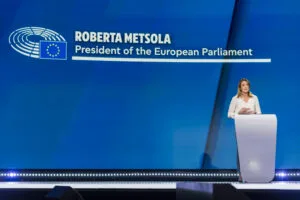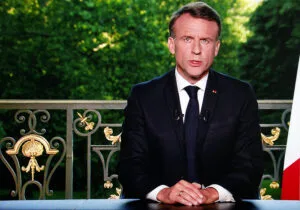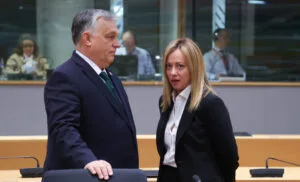Brussels – Amid the political earthquake in France and Germany, there is one certainty in these hectic 2024 European elections. The pro-European majority is alive despite the significant retreat from the previous legislature, and there is no credible alternative. The real winners of the electoral round of 6-9 June are the European Populars, who, based on the most up-to-date electoral data, can count on 185 seats (9 more), asserting themselves even more decisively as the leading force in the European Parliament and distancing the Social Democrats with 137 seats (-2) and the European Liberals with 80 (-22).

The current President of the European Commission, Ursula von der Leyen, emerged stronger thanks to the strong affirmation of her political family and the inability of the other European majority parties to impose new balances in a particularly delicate post-electoral framework. “Today is a great day for the EPP. We have won the elections, and we are an anchor of stability,” the Spitzenkandidatin (joint candidate) of the European Populars commented warmly in the hemicycle of the European Parliament. “It is true that the extremes on the left and right have gained strength, but the center is holding up, and we all have an interest in a stable and strong Europe,” stressed von der Leyen, and for this reason, “from tomorrow we will make contact with S&D and Renew Europe, we have worked well together in the last five years, and we will build a relationship of trust.”
At the moment, the projections for the new European Parliament are based on the still not final results of the 27 member states, subject to change until the publication of the final figures expected tomorrow morning (10 June). But in addition to the stability of the center, some general trends are already emerging: the defeat of the European Greens – down from 71 to 52 seats – the moderate advance of the European Conservatives and Reformists (ECR) and the extreme right-wing Identity and Democracy (ID) – respectively up from 69 to 73 seats and from 49 to 58 seats – and the unknown of the accessions to the various groups in the European Parliament by the national parties currently confined to the group of non-attached members or that will enter the Euro Chamber for the first time. The European Left limits the damage, losing only one seat, from 37 to 36.

“The European Parliament will start working as early as Tuesday, the group leaders will meet for a first conference of Presidents. They will take stock of the election results and establish a roadmap for the appointment of the presidency of the executive,” the President of the European Parliament, Roberta Metsola, announced, commenting on the first polls. “In the coming weeks, political groups will be formed. Majorities will have to form on a political programme that will give direction to our Union for the next five years. Until16 July, when “the inaugural session of the tenth legislature will be held in Strasbourg“, Metsola concluded: “I see today’s results as a sign of confidence from our citizens. Even if the turnout stands at 51 per cent at EU level, not even half a percentage point higher than the 50.66 per cent five years ago.
The pro-European majority holds
Claiming victory is the European People’s Party (EPP), the only one among the Ursula majority parties to have increased the number of MEPs in the next legislature. Propelling the European Popular Party’s impressive result are the electoral performance of the Germans of the Christian Democratic Union of Germany ( CDU) at 30.7 percent (31 seats out of 96), the Poles of the Civic Coalition at 38.2 percent (21 seats out of 53) and the Spaniards of the Partido Popular at 34.2 percent (22 seats out of 61). With the 185 MEPs certain in the next European Parliament – with a possible entry of the seven Hungarians from Tisza in sight – the EPP group is once again at the center of the political games and allows its Spitzenkandidatin to put itself in a pole position to be reconfirmed by the European Council, and a green light from the future new center majority in the European Parliament.

Special attention will have to go to the decisions of the French President, Emmanuel Macron, the big loser of these European elections. Considering the collapse of the Besoin d’Europe liberals, who will bring 10 fewer MEPs to Brussels (from 23 to 13), the French head of state may want to speed up the appointment of the next Commission presidency before the national vote on 30 June – hence at the European Council on 27-28 June – to avoid a stalemate of the EU institutions in the event of the reconfirmation of the rise of the extreme right of Rassemblement National. A blow also for the Spaniards of Ciudadanos, completely wiped out (by 7 MEPs), so Renew Europe will now only be able to count on the Spanish presence of one elected in the list of the Independents.
On the subject of the center holding up, with the Social Democratic Party of Germany (SPD) losing two MEPs and the Socialist Workers Party of Spain ( PSOE) losing one, there is a Democratic Party (PD) from Italy that sees its delegation grow from 15 to 20 MEPs and takes the lead in deciding the line of the S&D group in the European Parliament, and Frans Timmermans’ Dutch Socialists who – in alliance with the Greens – become the first national political force. With the Social Democrats limiting their losses and holding steady as numbers in the hemicycle, von der Leyen’s majority now stands at 402 seats (net of new accessions to the EPP, S&D, and Renew Europe groups), well above the 361 needed for the minimum limit.
The (not overwhelming) advance of the extreme right
An overwhelming tide of the extreme right was expected that ultimately did not occur. Or at least, not everywhere and not on such a scale as to challenge the majority in the European Parliament. In France, the triumph of Rassemblement National – 31.5 percent, more than doubling President Macron’s coalition – not only forced an early vote in the EU member country but also allowed the French party to become the driving force within the Identity and Democracy group with 30 MEPs, given the simultaneous collapse of the League (from 22 to 8). In addition to the Dutch Party for Freedom (from 0 to 6 MEPs), the German far-right Alternative für Deutschland (AfD) also asserted itself, which, despite its difficulties in recent months, hooks up with the SPD at 14.5% and brings 14 MEPs to Brussels. The party is currently suspended from the ID group, and the new French leadership will have to decide whether to mend the rift with the former allies to increase the political weight of the extreme right in Brussels (with the scenarios still uncertain in this political spectrum).

While waiting for the final results of the European elections and the choices of the political groups in the European Parliament, attention is now on the composition and choices of the European Conservatives and Reformists. As expected on the eve of the election, Fratelli d’Italia of the Italian premier Giorgia Meloni takes the stage with 24 elected MEPs. The Poles of Law and Justice (PiS) collapsed from 27 to 19 MEPs. The Spaniards of Vox did not break through (from 4 to 6) but can still become the third force in the European Parliament with the 10 Hungarians of Fidesz – talks have been going on for months between Meloni and the Hungarian prime minister, Viktor Orbán – and the 5 Romanians of the Alliance for the Romanian Union (Aur). Even if one did not take into account all the complexities that make this scenario almost impossible, an alliance of right-wingers in the European Parliament would still not have the numbers for a majority: the EPP, ECR, and ID currently stop at 316 seats, with the minimum quota at 361 a long way off even with potential new entrants in the right-wing groups. The same goes for a popular-conservative-liberal scenario, stuck at 338 seats.
The collapse of the Greens in the European elections
At the European level, the real losers are the Greens, who come out of the polls particularly downsized. The drop from 71 to 52 MEPs is explained by a general difficulty in all of the 27 Member States – although in Italy, the excellent result of the Green-Left Alliance will allow the arrival of three new Italian members (and three for the Left). Above all, in Germany, the 8 percentage points drop (from 20.5 to 12.5) translates into 8 fewer MEPs (from 25 to 17), and in France (from 12 to 5). The openness to a possible entry into the majority cannot hide the general failure to translate the demands of the Green Deal into a credible option for an electorate increasingly shifted to the right, as well as the end of any alternative majority of progressive forces on specific dossiers (as happened on some occasions in the last legislature): S&D, Renew Europe, Greens, and The Left stop at 305 seats, far from the minimum threshold.
The uncertainty of non-attached and new MEPs
 At center stage in the coming weeks in the European Parliament, until the inaugural session on 16 July, will be the acclamations of national parties currently not affiliated to any group or are entering the hemicycle for the first time. There are 99 MEPs (46 non-attached and 53 newly elected) who can still significantly change the weight of the political groups. In addition to the Hungarian center-right of Tisza (7) to the EPP, the Hungarians of Fidesz (10), and the Romanians of AuR (5) to the ECR, attention will be on the decisions of the German red-brown left of the Sahra Wagenknecht Alliance – Reason and Justice (5, two more than Die Linke) and the Slovakian Smer-Ssd (5) and Hlas-Sd (1), the pro-Russian Bulgarian nationalists of Vazrazhdane (3) and the Polish ones of Konfederacja (6), but above all the 9 MEPs of the 5 Star Movement who have never found a European political family. Not forgetting the far-right AfD with its 14 new members, currently without a group after being kicked out of Id. With the polls closed and the results of the vote published, work behind the scenes in Brussels on the formation of the new European Parliament is already in full swing.
At center stage in the coming weeks in the European Parliament, until the inaugural session on 16 July, will be the acclamations of national parties currently not affiliated to any group or are entering the hemicycle for the first time. There are 99 MEPs (46 non-attached and 53 newly elected) who can still significantly change the weight of the political groups. In addition to the Hungarian center-right of Tisza (7) to the EPP, the Hungarians of Fidesz (10), and the Romanians of AuR (5) to the ECR, attention will be on the decisions of the German red-brown left of the Sahra Wagenknecht Alliance – Reason and Justice (5, two more than Die Linke) and the Slovakian Smer-Ssd (5) and Hlas-Sd (1), the pro-Russian Bulgarian nationalists of Vazrazhdane (3) and the Polish ones of Konfederacja (6), but above all the 9 MEPs of the 5 Star Movement who have never found a European political family. Not forgetting the far-right AfD with its 14 new members, currently without a group after being kicked out of Id. With the polls closed and the results of the vote published, work behind the scenes in Brussels on the formation of the new European Parliament is already in full swing.








